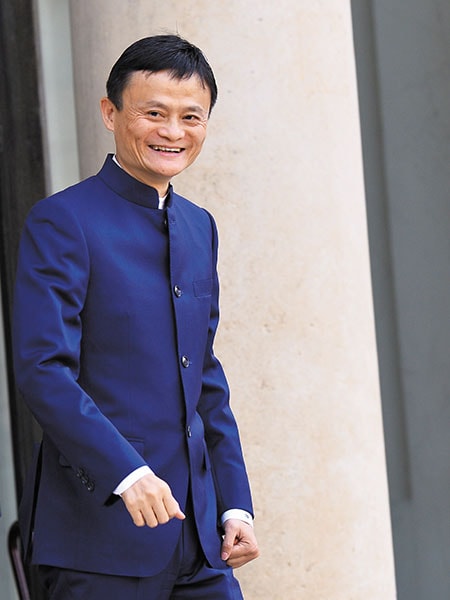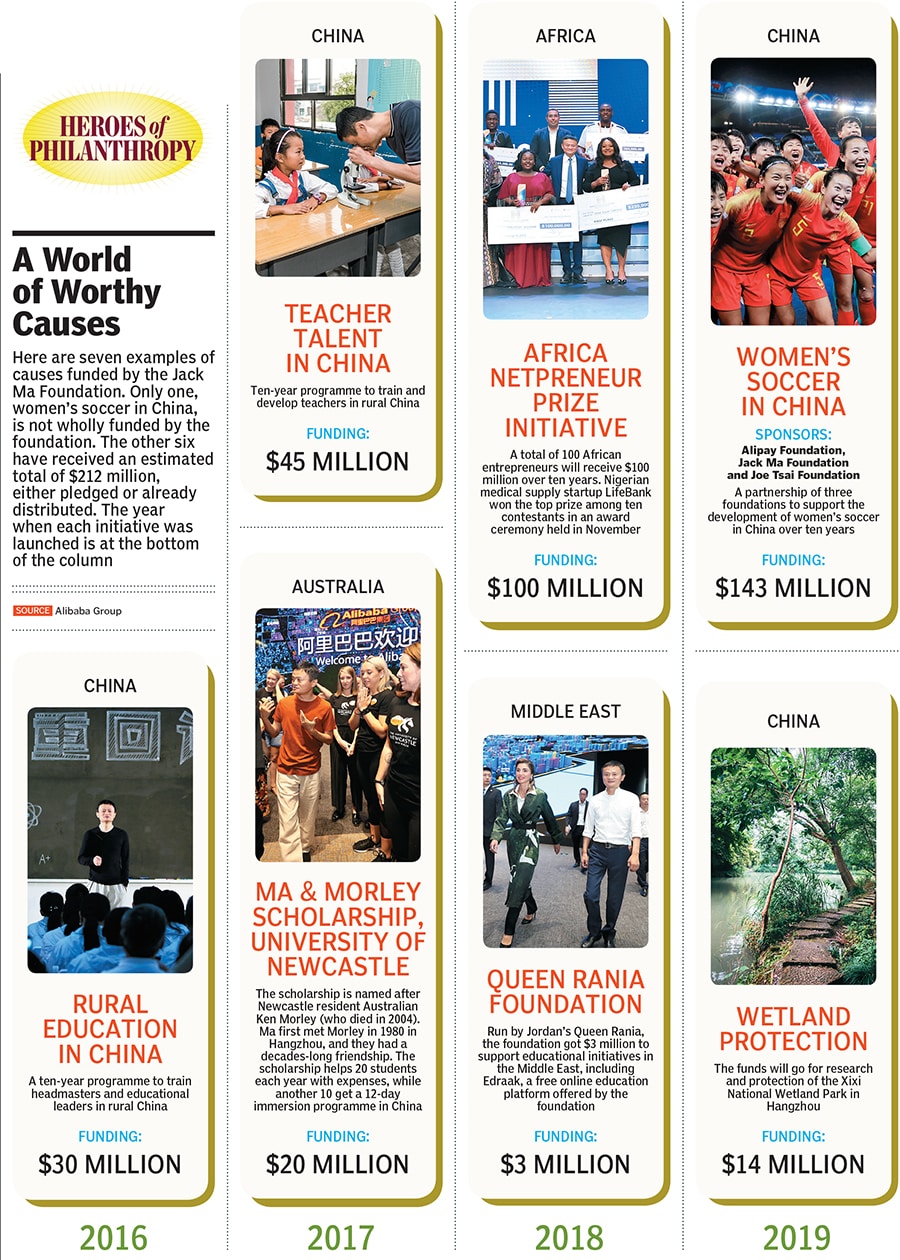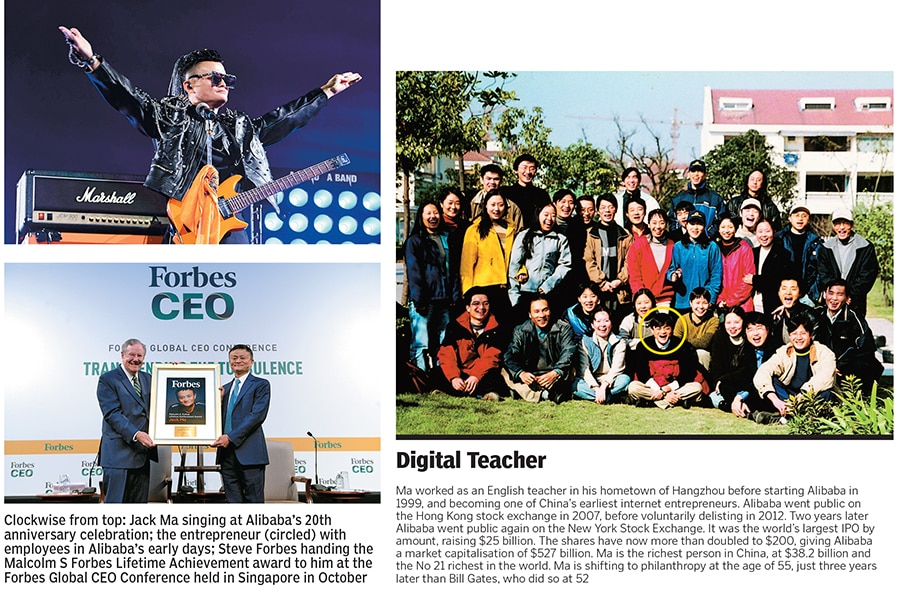Heroes of Philanthropy: A look at Jack Ma's next chapter
With a new focus on philanthropy, Jack Ma builds on a substantial base


 Image: Mustafa Yalchin / Anadolu Agency / Getty Images[br] People say I am one of the richest people in China, but I don’t think it is my money,” says Jack Ma. “It is money that people have entrusted to you, and you want to spend it in a better, smarter way.” Ma is explaining his new focus, philanthropy, in an exclusive interview with Forbes Asia in October. Having spent the last two decades building Alibaba Group, the Hangzhou, China-based internet giant, Ma announced just over a year ago he would step aside and give his executive chairman title to Alibaba CEO Daniel Zhang.
Image: Mustafa Yalchin / Anadolu Agency / Getty Images[br] People say I am one of the richest people in China, but I don’t think it is my money,” says Jack Ma. “It is money that people have entrusted to you, and you want to spend it in a better, smarter way.” Ma is explaining his new focus, philanthropy, in an exclusive interview with Forbes Asia in October. Having spent the last two decades building Alibaba Group, the Hangzhou, China-based internet giant, Ma announced just over a year ago he would step aside and give his executive chairman title to Alibaba CEO Daniel Zhang.
“I will devote more time and effort to education, philanthropy and the environment,” he wrote in an open letter to shareholders (and the world). It was a transition that Ma had planned for a decade. “When Alibaba had its 10-year anniversary, on that day I started to think I should prepare for my retirement. That day, I decided on the day of the 20-year anniversary, September 10, 2019, will be the day I leave,” he said during the Forbes Global CEO Conference held in Singapore in October, just after receiving the Malcolm S Forbes Lifetime Achievement award.
Now, having turned 55, Ma is entering a new chapter in his career—but one in which he has considerable experience. Alibaba, for example, has long had CSR programmes. In 2006, Alibaba launched its first organised philanthropy to help underprivileged mothers in China, dubbed the model mother programme. To date, some 20,000 mothers have got free training and funding to become online entrepreneurs.[br]The company made a major commitment in 2010, when Alibaba started to earmark 0.3 percent of its revenues to philanthropy. Two years later, it established the Alibaba Foundation to manage its philanthropic efforts. With $56 billion in revenues for the 2019 fiscal, 0.3 percent would be $168 million (Alibaba doesn’t disclose the actual figure).
Ma’s personal philanthropy started in 2014, when he set up the Jack Ma Foundation. In April that year, about six months before Alibaba’s IPO on the New York Stock Exchange, Ma set aside options representing 35 million shares to be put into his foundation. Today the Jack Ma Foundation has
23 million Alibaba shares, worth about $4.6 billion.
Since its founding, the Jack Ma Foundation has distributed or pledged at least $300 million, according to figures from Alibaba. This year, the foundation pledged about $14 million to protect wetlands in Hangzhou. The majority of funding for its projects comes from the foundation, however, it does accept small outside donations to help in some projects.
In addition, it also joined in July with the Alipay Foundation and Joe Tsai Foundation in a ten-year, $143 million pledge to support the development of women’s soccer in China (the Alipay Foundation is part of Alibaba’s affiliated Ant Financial and the Joe Tsai Foundation is funded by Alibaba Group co-founder Joe Tsai).
Aside from China, the foundation has helped causes in Africa, Australia and the Middle East. “Philanthropy is also about efficiency. If you can spend $3, why spend $5? If you can finish it in two hours, why do four hours? The way I learnt how to run a company, that is the way I learnt how to run a philanthropic organisation,” says Ma.Ma also wants to encourage the spirit of philanthropy in others. “The world won’t change because you donate money, but it will change if your heart is changed. You can never save all the poor people and heal all the illness, but we can wake up the kindness inside everyone in the world,” he said in 2016.
The former teacher has a special interest in improving education in his country’s rural and impoverished areas, and his foundation has already pledged at least $75 million to training teachers and headmasters, along with other educational efforts.
“China has a great culture of charity, but China needs to build up the culture of philanthropy,” says Ma. He’d like to develop academic programmes on philanthropy. “I want to develop a course with a university [in China] to train people in how to do philanthropy,” he says. As he said at the Forbes Global CEO conference: “I believe China one day [will have] hundreds of thousands of businesspeople who will build up their own charities or philanthropy foundations.”
Others share his view. “Asian philanthropists, particularly those in China, are still waiting, with great anticipation, to see what Jack Ma will do with his philanthropy. He has an extraordinary opportunity to be a leader and role model in the field,” says Laurence Lien, CEO of the Singapore-based Asia Philanthropy Circle, in emailed comments.
Ma hopes to do more to support women’s causes too. “The secret sauce of Alibaba’s success is that 34 percent of the senior leadership of Alibaba are women, and almost 47 percent of employees are women,” Ma said in Singapore.
So what will Ma do next as a philanthropist? First, he’ll do some research, as he wrote in last year’s open letter: “While I will not allow myself to sit idle, this time, I will be able to spend time on choosing interesting and meaningful causes that I can be passionate about.” He elaborated on this in his interview: “I am not in a hurry, I want to spend a year travelling around to many countries, talking to the ministers of education, talking to schools, talking to teachers, and talking to those who have great ideas.”
In November, Ma went to Ghana to be one of the judges in the first-ever African Netpreneur awards, sponsored by his foundation. “If we can discover and help more Jack Mas, Bill Gates, Warren Buffetts, Africa will be different,” says Ma.
The Jack Ma Foundation has only one office and less than 30 full-time staff. This may seem small, but recall in 2000, when Alibaba had only 150 employees, Ma declared to Forbes his intention to make Alibaba one of the world’s top ten websites. When asked where the Jack Ma Foundation will be in five years, Ma already appears to be planning ahead: “It will be a respected organisation that is doing things in an efficient way.”
First Published: Jan 17, 2020, 13:54
Subscribe Now
